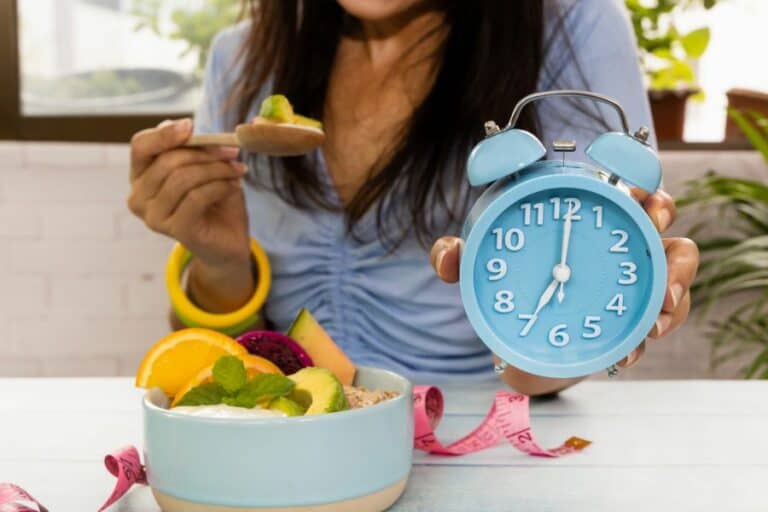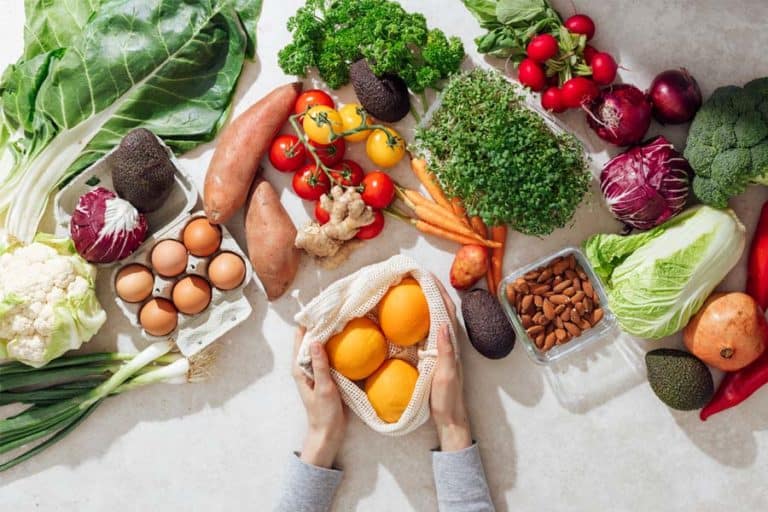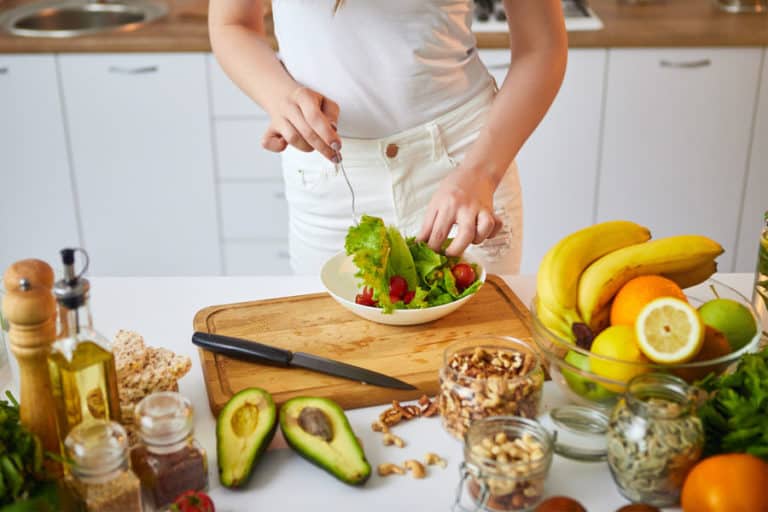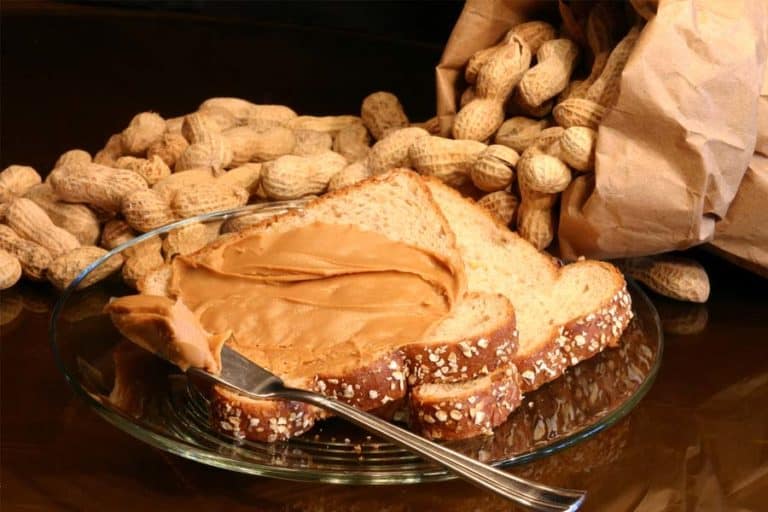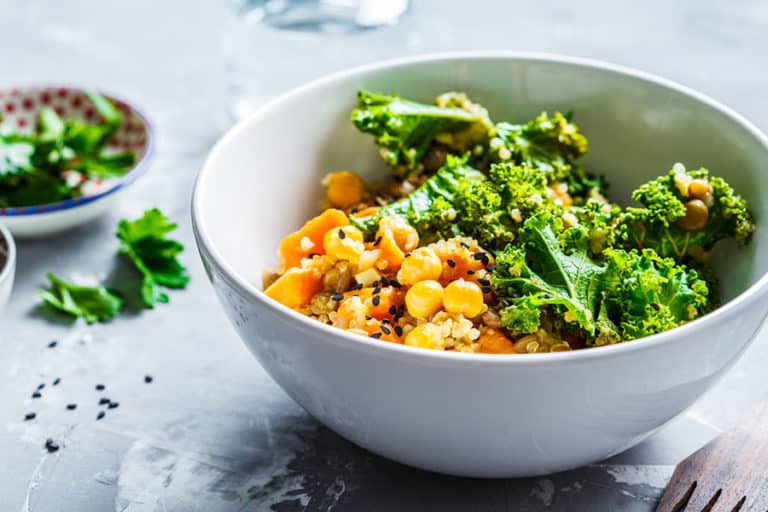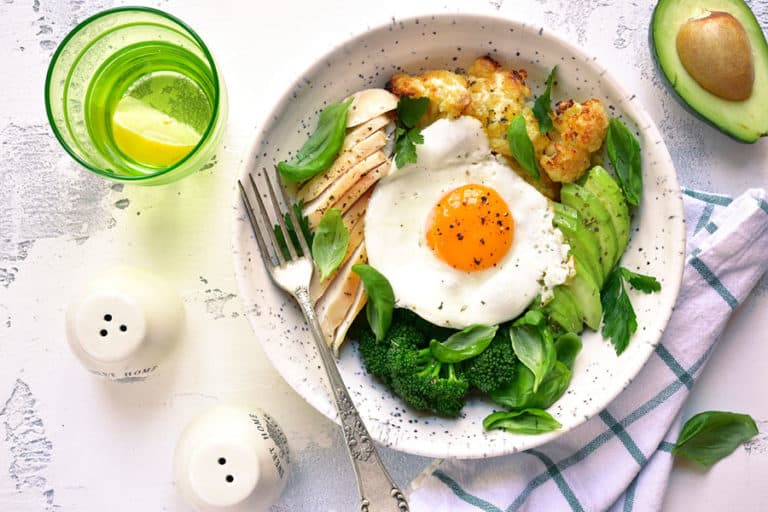Low Carb Vegan Diet: For A Healthier You
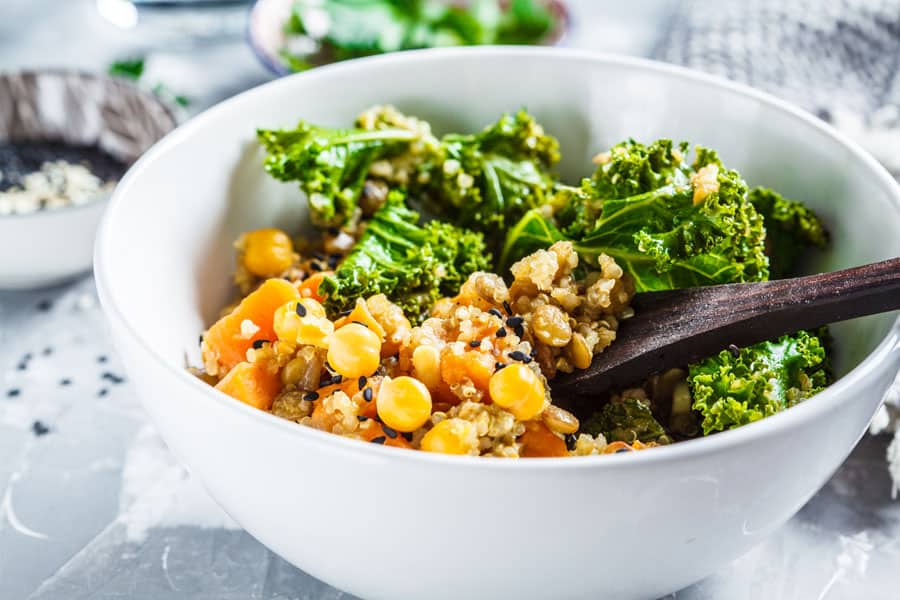
Low-Carb Vegan Diet | Parameters | Low-Carb Vegan Foods | Benefits | Risks | Low-Carb Vegan Recipes | 1-Week Meal Plan
The vegan diet is often touted to be a great way to lose weight. However, focusing on getting enough protein and other essential nutrients while on this diet is important.
A low-carb vegan diet is a perfect solution for people who want to reduce their environmental impact and lose weight.
What is a low carb vegan diet?
A low-carb vegan diet is a combination of a vegan diet and a low-carbohydrate diet.
The vegan part of the equation means avoiding all animal products, including meat, dairy, and eggs.
Whereas “low-carb diets” limit your intake of carbohydrates, typically by avoiding sugary and processed foods.
Instead, you focus on eating whole, plant-based foods that are high in fiber, healthy fat, and nutrients but low in calories
Can vegans go on a low-carb diet?
Yes, vegans can go on a low-carb diet. However, certain things should be kept in mind before transitioning into a low-carb vegan diet.
Since vegan diets themselves are already low in calories, going on a low-carb vegan diet may be more difficult than someone who is not a vegan.
Be sure to research and consult a physician or nutritionist before making any major changes to your diet.
Understanding a low-carb diet
There are many reasons why someone might follow a low-carb vegan diet.
Thus, it’s important to understand the basic parameters of a low-carb diet before starting one.
1. Keep a check on your carbs
As the name suggests, a low-carb vegan diet limits the amount of carbohydrates you consume.
While there is no strict definition of a low-carb vegan diet, it typically contains between 30 and 100 grams of net carbs per day.
Here are some general guidelines for carb intake on a low-carb vegan diet:
- People who have a high level of physical activity should consume 100-150 grams per day.
- People with moderate exercise should consume 50-100 grams per day.
- People who wish to lose weight at a faster rate without feeling too hungry should consume 20-50 grams per day.
A low-carb vegan diet may also be referred to as a vegan keto diet since keto diets are also low in carbs.
However, a ketogenic diet is more restrictive and typically very high in fat. When following a low-carb vegan diet, it’s important to focus on eating complex carbs instead of simple carbs.
Complex carbs are found in whole grains and vegetables, while simple carbs are in refined grains, sweets, and processed foods.
Some good sources of complex low-carb foods:
- Quinoa
- Oats
- Buckwheat
- Sweet potatoes
- Vegetables
- Fruits
- Beans
- Peas
- Lentils
2. Make your diet protein rich
Plant proteins, except soy, potatoes, and pea, [1]National Library of Medicine: Protein content and amino acid composition of commercially available plant-based protein isolates are “incomplete,” because they lack sufficient amounts of one or more essential amino acids.
Thus, a low-carb vegan diet should be rich in protein to ensure you get all the amino acids your body needs.
Some good sources of protein on a low-carb vegan diet include:
- Lentils
- Chickpeas
- Beans
- Tofu
- Tempeh
- Nuts and seeds
- Nut butters
It’s important to eat protein throughout the day instead of all at once. Your body uses protein best when you eat a minimum of 20 grams [2]National Library of Medicine: Defining meal requirements for protein to optimize metabolic roles of amino acids per sitting, but you probably don’t need more than 35 grams in total.
3. Include healthy fats
Healthy fats are an important part of a low-carb vegan diet. In the absence of carbs, they help you to feel full and can also promote heart health.
Some good sources of healthy fats include:
- Avocados
- Olive oil
- Coconut oil
- Nuts, and seeds
4. Pick foods abundant in nutrients
When following a low-carb vegan diet, it’s important to focus on nutrient-dense foods. This means foods that are high in nutrients but low in calories.
Vegans usually lack vitamin B12, iron, and omega-3 fatty acids. So it’s important to ensure you get enough of these nutrients through your diet.
Some nutrient-dense foods low in carbs and rich in iron, calcium, and zinc include:
- Leafy greens like spinach
- Ground linseed
- Hemp seeds
- Pumpkin seeds
- Kale
- Dried apricots
- Figs
- Raisins
- Quinoa
- Fortified breakfast cereal
Plant-based foods rich in Omega-3 [3]Physicians Committee for Responsible Medicine: Omega-3 Fatty Acids and Plant-Based Diets include:
- Walnuts
- Flaxseeds
- Chia seeds
- Hemp seeds
- Edamame
- Seaweed
- Algae
5. Ensure the intake of vitamin B12
Low-carb vegan diets may be lacking in vitamin B12.
Vitamin B12 is found naturally in animal products, so it can be difficult to get enough of it on a plant-based diet.
Vitamin B12 is important for the function of the nervous system and red blood cell formation. [4]National Institutes of Health: Vitamin B12
If you follow a low-carb vegan diet, it’s important to take a supplement or eat foods that are fortified with vitamin B12.
Some good sources of vitamin B12 include:
- Fortified breakfast cereals
- Seaweed
- Certain mushrooms
- Nutritional yeast.
6. Limit your intake of processed foods
Processed foods are high in unhealthy simple carbs, saturated fats, salt, and sugar. They can also contain additives and preservatives that are not good for your health.
When following a low-carb vegan diet, it’s important to limit your intake of processed foods and focus on eating whole foods instead.
List of low-carb vegan foods
Almost every plant-sourced food will have a certain amount of carbs. If you are considering a low-carb vegan diet, you must be careful to choose foods that have fewer and healthier carbs.
As mentioned above, look for foods that have a higher density of proteins and fats and acceptable amounts of complex carbs. Here is a list of foods that you can consume on a low-carb vegan diet:
- Healthy fats like olive oil, coconuts, and avocados
- Nuts and seeds like almonds, pistachios, sunflower seeds, and flaxseeds
- Beans and legumes like kidney beans, black beans, lentils, and chickpeas
- Tofu and tempeh
- Whole grains like oats, buckwheat, and quinoa
- Vegetables like broccoli, kale, cauliflower, and tomatoes
- Fruits like berries, oranges, and apples
- Fortified plant-based milk and yogurt
- Fortified breakfast cereal
Benefits of a low-carb vegan diet
Weight loss: Reducing the amount of carbs on a low-carb can lead to short-term weight loss. [5]Mayo Clinic: Low-carb diet: Can it help you lose weight?
Healthy blood sugar levels: A low-carb diet doesn’t spike blood sugar levels in the same way a high-carb diet does. Thus this helps regulate blood sugar levels and insulin.
Lower cholesterol levels: A low-carb vegan diet can help to lower cholesterol levels [6]Physicians Committee for Responsible Medicine: Lowering Cholesterol With a Plant-Based Diet as it is typically high in healthy plant-based fats. This diet also incorporates foods with healthy, soluble fibers, [7]National Lipid Association: Adding Soluble Fiber to Lower Your Cholesterol which bind cholesterol in the gut and remove it from the body.
Risks of a low-carb vegan diet
Increased risk of nutrient deficiencies: A low-carb vegan diet can put you at risk of deficiencies in certain nutrients, such as vitamin B12, iron, and omega-3 fatty acids.
Kidney damage: Extreme low-carb diet can put you in a state of ketosis. A prolonged state of ketosis can lead to kidney damage. [8]National Library of Medicine: Are low-carbohydrate diets safe in chronic or diabetic kidney disease? It may also cause fatigue and weakness.
5 Easy low-carb vegan recipes
Here are 5 easy low-carb vegan recipes that you can try:
1. Quinoa breakfast bowl
Ingredients:
- 1/2 cup cooked and cooled quinoa.
- 1 large ripe banana, sliced.
- 1/4 cup almond milk.
- 1 tablespoon chia seeds.
- 1/4 teaspoon ground cinnamon.
- Toppings of your choice (fresh fruit, nuts, etc.)
Instructions:
- In a bowl, combine cooked quinoa, banana, almond milk, chia seeds, and cinnamon.
- Mix until well combined and serve it with your favorite toppings.
2. Cauliflower rice burrito bowl
Ingredients:
- 1 cup cooked and cooled cauliflower rice.
- 1/2 cup black beans.
- 1/2 a tomato, diced.
- 1/4 cup salsa.
- 1 avocado, diced.
Instructions:
- In a bowl, combine cooked cauliflower rice, black beans, tomatoes, salsa, and avocado.
- Mix until well combined and serve.
3. Curried tofu bowl
Ingredients:
- 1/2 block tofu, diced.
- 1 tablespoon curry powder.
- 1/4 teaspoon ground turmeric.
- 1/4 teaspoon ground cumin.
- 1/2 a red onion, diced.
- 1/2 a green bell pepper, diced.
- 4 tablespoons of olive oil.
Instructions:
- In a pan over medium heat, add tofu, curry powder, turmeric, cumin, and onion.
- Cook for about 5 minutes, stirring occasionally, or until the tofu is browned.
- Add the bell pepper and cook for an additional 3 minutes.
- Serve on a bed of greens.
4. Edamame spaghetti
Ingredients:
- 1 package edamame spaghetti.
- 1/2 cup marinara sauce.
- 1/4 cup diced mushrooms.
Instructions:
- Cook edamame spaghetti according to package instructions.
- In a pan over medium heat, add marinara sauce and mushrooms.
- Cook for about 5 minutes, stirring occasionally, or until the mushrooms are cooked through.
- Drain the edamame spaghetti and add it to the pan with the sauce.
- Serve after mixing all the ingredients well.
5. Berry breakfast smoothie
Ingredients:
- 1 cup almond milk/coconut milk.
- 1/2 cup frozen mixed berries.
- 1 ripe banana, sliced.
- 1 tablespoon chia seeds.
Instructions:
- In a blender, combine almond milk/coconut milk, frozen berries, bananas, and chia seeds.
- Blend until smooth and serve in a bowl.
1-week meal plan for a low-carb vegan diet
Here is a meal plan to eat low-carb vegan for a week:
Monday
Breakfast: Quinoa breakfast bowl
Lunch: Curried tofu bowl
Dinner: One pot lentil soup
Tuesday
Breakfast: Berry breakfast smoothie
Lunch: Cauliflower rice burrito bowl
Dinner: Spaghetti squash with tomato sauce
Wednesday
Breakfast: Overnight oats with almond milk, chia seeds, and berries
Lunch: Chickpea salad wrap
Dinner: Curried red lentil soup
Thursday
Breakfast: Breakfast smoothie with almond milk, banana, and spinach
Lunch: Edamame spaghetti
Dinner: One pot Thai quinoa curry
Friday
Breakfast: Oatmeal with almond milk, diced apple, and cinnamon
Lunch: Tomato basil soup
Dinner: Roasted cauliflower tacos
Saturday
Breakfast: Pancakes made with almond flour, chia seeds, and bananas
Lunch: Spaghetti squash with vegan Alfredo sauce
Dinner: Eggplant parmesan
Sunday
Breakfast: Tofu scramble with veggies
Lunch: Kale salad with lemon dressing
Dinner: Butternut squash mac and cheese
Conclusion
A low-carb vegan diet can be a great way to lose weight healthily. This diet includes low-carb, plant-based foods, such as vegetables, fruits, legumes, whole grains, and nuts.
However, it is important to choose low-carb vegan foods that are high in fiber, nutrients, and healthy fats to ensure you get all the nutrients your body needs. Lastly, the meal plan provides ideas for tasty and nutritious low-carb vegan meals that you can program throughout the week.
References
| ↑1 | National Library of Medicine: Protein content and amino acid composition of commercially available plant-based protein isolates |
|---|---|
| ↑2 | National Library of Medicine: Defining meal requirements for protein to optimize metabolic roles of amino acids |
| ↑3 | Physicians Committee for Responsible Medicine: Omega-3 Fatty Acids and Plant-Based Diets |
| ↑4 | National Institutes of Health: Vitamin B12 |
| ↑5 | Mayo Clinic: Low-carb diet: Can it help you lose weight? |
| ↑6 | Physicians Committee for Responsible Medicine: Lowering Cholesterol With a Plant-Based Diet |
| ↑7 | National Lipid Association: Adding Soluble Fiber to Lower Your Cholesterol |
| ↑8 | National Library of Medicine: Are low-carbohydrate diets safe in chronic or diabetic kidney disease? |


